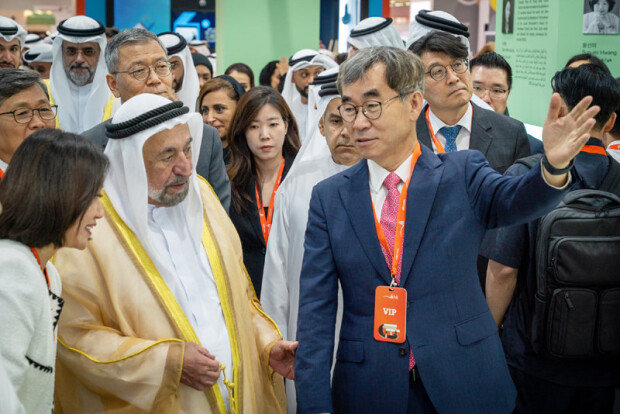Sheikh of Sharjah skims K-poetry and K-novels
Sheikh of Sharjah skims K-poetry and K-novels
Posted November. 03, 2023 09:00,
Updated November. 03, 2023 09:00

“Here comes the Sheikh!”
In the 42nd Sharjah International Book Fair held at the Expo Center Sharjah in the United Arab Emirates on Wednesday, visitors looked highly excited to see Sheikh Sultan bin Muhammad Al-Qasimi, the ruler of the Emirate of Sharjah, looking around a booth dedicated to South Korea, the book fair’s guest-country of honor. Middle Eastern publishers were dazzled by the leader, who turned the emirate into the hub of the publishing industry, making a visit to the event. Taking a brief look at Jeong Ho-seung’s book of poetry “I Refuse Hope” and Kim Ae-ran’s novel collection “Summer Outside,” Sheikh Dr. Sultan said that he hopes to see translated versions of many South Korean books available in the region. After he left the venue, dozens of publishers from Middle Eastern nations including the UAE, Egypt, and Lebanon flocked to leaf through Korean-written books.
As one of the UAE's seven emirates, Sharjah has a population of 1.4 million or the third largest population, following Abu Dhabi (2.9 million) and Dubai (2.7 million). It has shown so great an interest in the book industry that it runs an independent governmental body, the Sharjah Book Authority. Also, the Sharjah Publishing City Free Zone allows foreigners to be exempt from tax duties when they open a publishing company and publish books. Founded in 1982, the Sharjah International Book Fair is one of the largest events in the Middle East. It is free to attend. Available by Nov. 12, this year’s book fair is joined by more than 2,000 publishing companies from 109 countries.
South Korea made the first visit as the event’s guest country of honor, with K-books gaining attraction following K-drama and K-pop. Chairman Ahmed bin Rakkad Al Ameri of the Sharjah Book Authority told South Korean reporters on Wednesday that South Korean books provide a window into the country itself, adding that the Sharjah Publishing City Free Zone makes it possible to publish books of Indian-born British author Salman Rushdie without limitation, for example. He was sentenced to death, called a fatwa, from 1988 to 1998 by Iranian religious leader Ayatollah Ruhollah Khomeini for negatively describing Muhammad, the founder of Islam, in his novel “The Satanic Verses.”
The South Korean pavilion is available under the theme of “Unlimited Imagination” sending a message that imagination in books has the power to resolve global challenges such as war and poverty. The 189-square-meter space showcases 79 Korean-written books ranging from belles-lettres pieces, including the poetry book “After Earth Dies, who will Moon Orbit?” by Kim Kye-soon from genre fiction such as the sci-fi novel “Tower” by Bae Myeong-hoon. It introduces not only leading South Korean authors such as Jeong Ho-seung, Kim Ae-ran, and Hwang Sun-mi but also Jeong Mu-nee and other webtoonists.
Added to this, visitors can come across works translated into the Arabic language including “The Plotters” by Kim Eon-su. “This full-length novel was first published in Arabic in Egypt in 2021,” he said. “As the UAE and Lebanon are Arabic speakers, it is inspiring that they can also access my book.” President Kwak Hyo Hwan of the Literature Translation Institute of Korea expected that the Middle East publishing market would provide South Korean authors with a great deal of opportunity if more of their works were translated into Arabic.
hoho@donga.com
Headline News
- Joint investigation headquarters asks Yoon to appear at the investigation office
- KDIC colonel: Cable ties and hoods to control NEC staff were prepared
- Results of real estate development diverged by accessibility to Gangnam
- New budget proposal reflecting Trump’s demand rejected
- Son Heung-min scores winning corner kick







